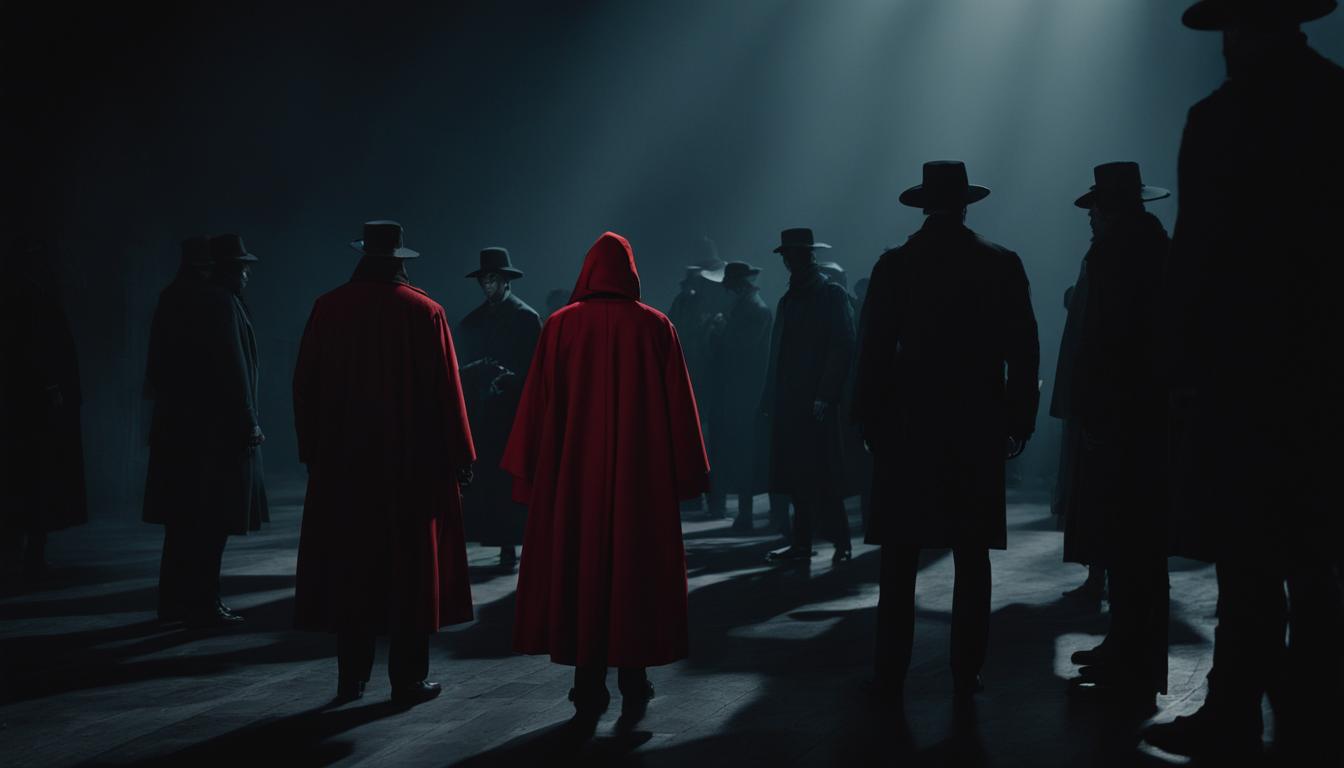Join us on a journey through the intricate tapestry of World War II in Sarah Waters’ audiobook, “The Night Watch.” In this audiobook review, we will delve into the author’s reputation, narrating style, plot, themes, and more to offer you a comprehensive view of the listening experience. Sarah Waters is a renowned author known for her spellbinding historical fiction novels, and “The Night Watch” is no exception.
Whether you are a fan of the author or just looking for your next audiobook listen, “The Night Watch” is a must-try. With vivid language, excellent narration, and a captivating plot, this audiobook is sure to leave a lasting impression.
Introduction to “The Night Watch”
“The Night Watch” by Sarah Waters is a captivating novel that takes us on a journey through the lives of four characters during and after World War II. Set in London, the book explores the complexities of relationships and the profound changes brought about by war. Sarah Waters’ writing has won numerous awards and accolades, cementing her reputation as a master of historical fiction.
The story is divided into three parts, with each section moving backwards in time. Starting in 1947, the book takes us back to 1944 and 1941, respectively, providing a unique perspective on how the war impacted the characters. The audiobook version features rich narration, adding an immersive element to the experience.
| Author | Genre | Publisher | Publication Date |
|---|---|---|---|
| Sarah Waters | Historical Fiction | Virago Press | 2006 |
At its core, “The Night Watch” is a tale of love, loss, and survival in a time of great upheaval. The novel explores themes of queer identity, gender roles, class, and family dynamics, bringing depth and nuance to the characters’ experiences.
Plot Overview:
The book opens in 1947 and follows the lives of Kay Langrish, Helen Giniver, Viv Pearce, and Duncan Pearce, who are all interconnected in different ways. Kay is a former ambulance driver who works in a factory, living with Helen, who is a struggling artist. Viv is a wealthy but troubled young woman who is romantically involved with a man named Reggie; Duncan is Viv’s brother, who joins the army.
As the story moves backwards in time, we learn how the characters met and what happened to them during the war. The book explores how the war changed their lives irrevocably, testing their relationships and sense of self in unexpected ways.
The plot is character-driven, with each character’s experience and perspective contributing to the overall narrative. The book’s structure is unconventional, providing a unique and captivating reading experience.
Narration Style of the Audiobook
The narration style is one of the key elements that can make or break an audiobook listening experience. In the case of “The Night Watch,” the audiobook, masterfully narrated by Juanita McMahon, effectively captures the emotional depth and complexity of Sarah Waters’ characters and story.
McMahon’s skillful delivery brings the tale to life, skillfully conveying the nuances of each character’s thoughts and feelings with a fresh clarity of voice. Her command of various accents and tones lends authenticity to the cast of characters, making them easy to differentiate from one another.
The audio performance draws the listener in and creates a vivid, immersive listening experience that allows the audience to relive the era with acute sensitivity to wartime struggles.
Overall, the narration style of “The Night Watch” is captivating and well-suited to the material, making for a highly engaging audiobook experience.
Plot Summary
Set in London during World War II, “The Night Watch” by Sarah Waters follows the lives of four characters – Kay, Helen, Viv, and Duncan – whose stories are intertwined in unexpected ways. The novel’s narrative begins in 1947 and moves backward in time to the years of the war, exploring the complex relationships and secrets that bind the characters together.
The story delves into themes of love, loss, betrayal, and sacrifice, as each character struggles with their own personal demons and endeavors to find purpose and meaning in a world of chaos and uncertainty. As the war progresses, the characters are forced to confront their fears and navigate the challenges of a society in flux, where relationships are constantly shifting and obligations are unclear.
The plot of “The Night Watch” is intricately woven, with flashbacks and unexpected twists that keep the reader engaged. Ultimately, the novel is a poignant exploration of the human experience during a momentous period in history.
Character Development
“The Night Watch” by Sarah Waters features a diverse cast of characters that undergo significant development throughout the story. While exploring the lives of four Londoners during World War II, the narrative delves into their motivations, fears, and desires, painting a rich and vivid portrait of their emotional struggles.
The main characters, Kay Langrish, Helen Giniver, Vivien Etheridge, and Duncan Pearce, are intricately interconnected, with their lives and stories intertwining in unexpected ways. Through their experiences, readers witness their growth and transformation, as they wrestle with love, loss, and hidden desires.
Kay, an ambulance driver, struggles to reconcile her romantic feelings for a fellow driver with her wartime duties. Helen, a struggling writer, grapples with her past and present relationships, while Vivien’s secret past threatens to disrupt her comfortable present. Duncan, a young man from Wales, navigates his newfound identity amid the chaos of war.
The intricate character development in “The Night Watch” allows readers to connect with the protagonists at a deep, emotional level. Through their journeys, we see different facets of their personalities, and how they cope with the challenges of their experiences.
The audiobook’s narrator, Juanita McMahon, brings these characters to life with her masterful voice acting. Her ability to capture their unique personalities and convey the emotional nuances of their experiences elevates the listening experience to another level.
Overall, the character development in “The Night Watch” is a standout feature that sets it apart from other works in the genre. It is a testament to Sarah Waters’ skill as a writer, and her ability to craft complex, fully realized characters.
Historical Accuracy and World War II Setting
The Night Watch by Sarah Waters immerses the reader in the distinctive setting of World War II London. Waters masterfully captures the era’s mood, where the constant terror of air raids hung in the air like a heavy fog. The author weaves a remarkable tapestry of historical accuracy that underpins the novel, transporting its readers to an era of darkness and conflict.
Through her extensive research, Waters showcases a profound familiarity with the period’s historical events, ensuring that her readers are fully immersed in the setting. The vivid portrayals of air raid sirens, underground shelters, and the destruction of London’s iconic landmarks provide an accurate reflection of the wartime setting.
Moreover, Waters utilizes these accurate historical events to set the scene for the spellbinding narrative that unfolds. The author’s attention to historical detail lends a sense of authenticity and gravitas to the story, captivating readers with the realism of the wartime events.
The novel’s themes of love and sacrifice are deeply intertwined with its historical setting, highlighting the impact that the war had on ordinary people. Through the characters’ emotional journeys, the author explores how the wartime setting amplified the sense of urgency and intensity in their relationships, creating complex and profound personal experiences.
Table: Historical Accuracy and Wartime Setting
| Historical Accuracy | Wartime Setting |
|---|---|
| Waters showcases a profound familiarity with historical events | Portrayals of air raid sirens, underground shelters, and the destruction of London landmarks |
| The author’s attention to detail lends authenticity and gravitas | The setting amplifies the intensity of the characters’ relationships |
| Historical events provide the backdrop for the spellbinding narrative | The wartime setting creates complex and profound personal experiences |
Pacing and Structure

As one of the most compelling aspects of “The Night Watch,” the audiobook’s pacing and structure are carefully crafted to maintain the listener’s interest throughout the story. Sarah Waters masterfully employs flashbacks and other narrative techniques to provide insight into the characters and their relationships.
The pace is gradual and immersive, building on each character’s journey and gradually intertwining them. The characters’ stories unfold in a nonlinear structure that rewards the listener’s attention without becoming confusing or overwhelming. In addition, the narrator’s skilled delivery enhances the flow of the story, allowing for seamless transitions between past and present events.
Overall, the pacing and structure of “The Night Watch” are exceptional, creating a powerful listening experience that will captivate audiences and leave a lasting impression.
Emotional Impact
One of the standout attributes of “The Night Watch” is its ability to provoke a strong emotional impact on the readers. Sarah Waters has crafted a powerful narrative that explores love, loss, and sacrifice amidst the chaos of World War II. The audiobook version only enhances this emotional resonance with its skilled narration and vibrant portrayal of the characters.
Listeners can expect to feel a range of emotions while experiencing “The Night Watch.” There are moments of tension that will keep them on the edge of their seats, as well as heart-wrenching instances of sadness that will leave them feeling empathetic towards the characters. However, there are also celebratory moments of joy that bring a sense of hope and light to the story. Overall, the emotional impact of “The Night Watch” is undeniably profound and unforgettable.
In fact, many readers have shared their personal responses to the emotional impact of this book, with some describing it as a cathartic and life-changing experience. “The Night Watch” has resonated deeply with audiences, and it has become a beloved classic in contemporary fiction. Its emotional depth and sincerity are a testament to Sarah Waters’ talent as a writer and the power of storytelling to touch the human heart.
Themes Explored
“The Night Watch” by Sarah Waters intricately weaves together various themes, providing a rich tapestry of human experience amidst the turmoil of World War II. Love, loss, sacrifice, resilience, and the effects of war are prominent throughout the story and offer an in-depth exploration of the depths of human emotion.
The theme of love takes center stage as the characters navigate through the complexities of their relationships. From deep-seated passion to unrequited love, Waters explores the various forms of love and their impact on our lives.
The devastating effects of war are also highlighted in the novel. The physical and emotional toll it takes on individuals is explored through the characters’ experiences, emphasizing the long-lasting impact that war has on both the individual and society as a whole.
Loss and sacrifice are also prominent themes in “The Night Watch.” Characters are forced to grapple with the idea of sacrifice as they navigate the harsh realities of war and loss. The author expertly captures the emotional toll of loss and the lengths that individuals will go to in order to cope with the pain.
Finally, “The Night Watch” explores the themes of resilience and human strength. The characters undergo a deep internal journey, highlighting the importance of perseverance and strength in the face of adversity.
Writing Style and Language

One of the most striking aspects of “The Night Watch” is Sarah Waters’ writing style. Her prose is vivid and evocative, immersing the reader in the lives of her characters and the historical setting of World War II. Her language is rich and lyrical, with vivid descriptions and powerful imagery that bring the story to life.
Waters’ writing is also notable for its depth and complexity, with multi-layered themes and subplots that add depth and nuance to the narrative. Her characters are fully realized and believable, with realistic flaws and motivations that make them feel like real people rather than caricatures.
This combination of strong writing, compelling storytelling, and rich historical detail makes “The Night Watch” a standout audiobook for fans of literary fiction and historical drama.
Comparisons to Other Works by Sarah Waters
“The Night Watch” shares several common themes and narrative techniques with other works by Sarah Waters. Like “Fingersmith” and “The Paying Guests,” “The Night Watch” explores the complexities of same-sex relationships and the societal constraints of the time. The author’s signature writing style, characterized by vivid prose and rich historical detail, is evident in all three novels.
However, “The Night Watch” stands out for its unique structure and themes. Unlike Waters’ two previous novels, which follow a linear chronological timeline, “The Night Watch” employs a reverse chronology, beginning in 1947 and gradually working back to 1941. This structure provides a novel and intriguing perspective on the aftermath of World War II and the losses suffered by the characters.
Compared to Waters’ earlier works, “The Night Watch” also emphasizes the theme of resilience and the power of human connection to overcome hardship. The characters’ emotional journeys are compelling and nuanced, with moments of tenderness and self-discovery that linger in the reader’s mind long after the final page.
Comparing Themes in Sarah Waters’ Novels
| Novel | Exploration of same-sex relationships | Historical detail | Non-linear storytelling | Themes of resilience and human connection |
|---|---|---|---|---|
| The Night Watch | Yes | Rich | Reverse chronology | Emphasized |
| The Paying Guests | Yes | Rich | Linear | Secondary |
| Fingersmith | Yes | Rich | Linear | Secondary |
Reception and Critical Acclaim
When “The Night Watch” was first published in 2006, it was met with critical acclaim and widespread reception from readers. The audiobook version was no exception, with narrators Juanita McMahon and Jill Balcon bringing Sarah Waters’ story to life in a captivating way that resonated with listeners.
According to a review from BookPage, “The Night Watch” is a “powerful exploration of war’s impact on the human heart”, and the audiobook version offers a “stunning narration that engenders empathy for the characters.” Meanwhile, The Guardian called it a “gripping, emotionally charged story” and praised the audiobook for its “sensitive depiction of a tumultuous era.”
| Source | Review |
|---|---|
| BookPage | “The Night Watch” is a “powerful exploration of war’s impact on the human heart”, and the audiobook version offers a “stunning narration that engenders empathy for the characters.” |
| The Guardian | “The Night Watch” is a “gripping, emotionally charged story,” and the audiobook provides a “sensitive depiction of a tumultuous era.” |
| Library Journal | The audiobook version of “The Night Watch” is a “well-produced, worthwhile recording…the narrators’ accents and intonations beautifully capture the sense of time and place.” |
Moreover, “The Night Watch” won the 2006 Stonewall Book Award and was shortlisted for the 2006 Man Booker Prize, cementing its status as a must-listen audiobook for historical fiction fans.
Listener’s Perspective
As a listener, “The Night Watch” by Sarah Waters left a lasting impression on me. The narration style was captivating, expertly bringing the characters and their stories to life. The use of flashbacks added depth to the narrative, allowing for a more comprehensive understanding of the characters’ motivations and experiences.
The emotional impact of the story was profound, with moments of intense sadness and joy that kept me engaged throughout. The themes of love, loss, sacrifice, and resilience resonated with me personally, making the story feel even more poignant.
While the pacing and structure of the book were at times slow, the writing style and language were exquisite, with evocative imagery and beautiful prose. Overall, “The Night Watch” is a standout audiobook that I would highly recommend to anyone who enjoys historical fiction and character-driven narratives.
Recommendations and Target Audience
Overall, “The Night Watch” audiobook is a must-listen for lovers of historical fiction, particularly those interested in World War II-era London. The emotional depth of the characters and the skillful narration make for a captivating listening experience.
However, readers who prefer fast-paced stories with explicit action may find the slow-burn approach and emphasis on character development less appealing. Additionally, this audiobook deals with complex themes such as love, loss, and sacrifice, making it best suited for mature listeners.
We recommend “The Night Watch” to fans of Sarah Waters’ previous works, such as “Fingersmith” and “The Paying Guests,” as the style and themes are similar. History enthusiasts and those who want to delve deeper into the human impact of World War II will also find this audiobook engaging.
Impact and Legacy
Over a decade after its release, “The Night Watch” by Sarah Waters continues to leave a profound impact on its readers and the literary community at large. The novel’s legacy is marked by its intricate and emotionally resonant storyline, as well as its unique portrayal of World War II England and its aftermath.
As a work of historical fiction, “The Night Watch” has influenced other writers in the genre, inspiring them to explore new narratives beyond the conventional war story. The intricate relationships between the characters and their personal journeys have also left a lasting impression on readers, making it a beloved and oft-discussed book in literary circles.
While there have been no official adaptations of the audiobook, it has garnered critical acclaim and a dedicated listenership. Its impact lies not only in its gripping narrative but also in the transformative power of its narration, with the voice performance delivering a unique listening experience that captivates and touches the listener.
Overall, “The Night Watch” has left a profound impact on the literary world, cementing Sarah Waters as a powerful voice in historical fiction and offering a poignant exploration of the human experience during wartime. Its legacy is sure to endure, inspiring future generations of writers and readers alike.
Conclusion
After a comprehensive review of “The Night Watch” audiobook by Sarah Waters, it is clear that the production delivers a captivating listening experience. The narration style, provided by Juanita McMahon, impresses with its ability to bring the characters to life and infuse the story with emotion.
The plot, set in World War II, is rich and evocative, delving into love, loss, sacrifice, and the resilience of the human spirit. The historical accuracy and attention to detail in capturing the era are especially noteworthy, providing a realistic and immersive experience for the listener.
The writing style, language, and literary craftsmanship of the author are also commendable, with skillful use of imagery and narrative techniques.
Overall, “The Night Watch” audiobook is highly recommended for fans of historical fiction, war stories, and character-driven narratives. Those seeking a poignant and emotionally resonant listening experience will find this audiobook particularly satisfying.
As a final thought, “The Night Watch” is a testament to the power of storytelling, reminding us of the enduring impact of war and the human capacity for hope, love, and perseverance.



